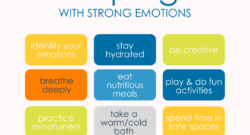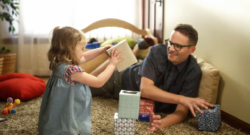Author: Upopolis Team
Coping with strong grief emotions
When someone you know dies, it can affect you and the people you know in many different ways. These changes can be very hard, so it can be helpful to find healthy ways to cope with strong emotions.
Here are 10 ways you can cope with all the strong emotions that come with grief:
- Learn the names of your emotions so you can better understand what you are feeling and share your emotions with someone else.
- Practice deep breathing and mindfulness activities (this can include lots of activities such as yoga, exploring the senses, spending time in nature, journaling, or doing arts and crafts).
- Move your body in ways that feel good for you, such as walking, dancing, or exercising.
- Eat meals that are full of good nutrients, and stay hydrated by drinking lots of water.
- Take a warm or cold bath/shower – whichever feels best for you.
- Find time to relax and rest your body, including sleeping.
- Engage in something creative such as music, art or dance.
- Play and do activities that you enjoy, every day if you can!
- Spend time in places that help you feel safe, calm, and comfortable. This can be your home, with friends or loved ones, or some place special to you.
- Talk with people you can trust and who really care for you.
Children’s Grief Awareness Day is on November 16 and was designed to help bring awareness to the needs of children and youth who are grieving. Click here to learn more: https://www.childrensgriefawarenessday.org/cgad2/index.shtml
7 Tips for Health Professionals who work with adolescent patients, from me! A Upopolis teen
I’m Jenna – a former pediatric patient, current adult patient, chronic illness advocate, veteran Upal, current Upopolis member, and a 19-year-old disabled queen. I want to share some valuable insights for healthcare providers on how to better support and communicate with teenagers.
It’s crucial to bridge the gap between treating teens like children and acknowledging that they are not quite adults yet, all while avoiding stigmatization and promoting a comfortable environment for their care. Here are a few tips for every professional who works with teenage patients who have a chronic or critical illness:
1. Respect Their Maturity: Teenagers, regardless of their medical condition, appreciate being treated with respect. It’s essential for healthcare providers to acknowledge their maturity and individuality. Try not to speak down to them or dismiss their feelings and concerns. Teens may not be adults, but they are capable of understanding their health conditions and making informed decisions.
2. Avoid Stigmatization: Teens are pretty cool, and they don’t want to be judged or stigmatized based on their age or appearance. Avoid making assumptions about their behavior or lifestyle choices. Be open-minded and supportive, recognizing that everyone’s journey is unique. Stigmatization only creates barriers to effective healthcare.
3. Offer Distraction and Support: For teenagers, undergoing medical procedures or facing chronic illnesses, distraction items, or offering support from a professional like a child life specialist, can be incredibly helpful. These professionals are skilled at providing emotional support and creative distractions that make the medical experience less intimidating. Whenever possible, involving them can ease the stress and anxiety teenagers may feel during their healthcare journey.
4. Address Body Image Issues: Body shaming has no place in healthcare. Teenagers, just like adults, can experience body image insecurities. When providing care, be mindful of your language and actions. Promote positive body image and self-acceptance. Encourage open conversations about body-related concerns, but always do so with empathy and sensitivity.
5. Be Kind and Empathetic: Kindness goes a long way, especially when working with teenagers facing health challenges. Showing empathy and compassion can make a significant difference in how teenagers perceive their healthcare experiences. Listen actively, validate their feelings, and offer emotional support. A little kindness can alleviate anxiety and foster trust.
6. Encourage Independence: While it’s important to provide guidance and support, empowering teenagers to take charge of their health is equally vital. Encourage them to ask questions, express their concerns, and actively participate in their treatment plans. By promoting independence, healthcare providers can help teens develop essential life skills for managing their health in the future.
7. Foster Communication: Effective communication is the cornerstone of quality healthcare. Ensure that teenagers have the opportunity to voice their opinions, ask questions, and participate in shared decision-making. Create a safe and non-judgmental environment for open dialogue, which can lead to better treatment adherence and overall well-being.
As a former pediatric patient, current adult patient, and chronic illness advocate, I can attest to the importance of healthcare providers following these guidelines when working with teenagers. It’s crucial to strike a balance between recognizing their maturity and providing age-appropriate care, avoiding stigmatization, and fostering a respectful, supportive environment. Distraction items, kindness, and empowerment are essential components of ensuring a positive healthcare experience for teenagers, regardless of their health challenges. By implementing these tips, healthcare providers can make a profound impact on the lives of their young patients, promoting their overall well-being and encouraging them to take an active role in their healthcare journey.
Parents: How to support youth who have a sibling with a medical illness
When any child faces illness or hospitalization, the entire family is impacted, including the siblings. During this time, the focus for parents is typically on the sick child; unfortunately, this means that the challenges and needs of siblings often go unrecognized and as a result, siblings do not receive the attention or support they need. It’s very common for siblings of every age to face numerous challenges, feelings, and reactions in response to their brother or sister’s illness.
When a child becomes ill, youth siblings may be confronted with changes to their typical routines, are often separated from family members, may receive less attention from caregivers, have difficulty relating to their peers, and may have fears or misconceptions in relation to their sibling’s condition. These challenges can lead to siblings experiencing feelings of anger, jealousy, worry, anxiety, and guilt. In response, siblings may become more withdrawn and engage less with others, have increased outbursts, and face challenges at school.
School-aged siblings (6-13 years old) commonly worry about their sick sibling and losing them, they may become resentful because of the changes in their routines and life, and jealous of the attention their sibling is receiving. The sibling may feel embarrassed, confused, and guilty; they may also become withdrawn, clingy and uncooperative.
Here are 5 tips to help you support your school-aged child(ren):
- Involve them in the healthcare journey as much as possible, and only if they want to be.
- Give them control and choice whenever and wherever possible while continuing to discipline appropriately.
- Encourage questions and give explanations.
- Maintain routines when possible.
- Ensure you are spending quality alone time with them.
- Always acknowledge and support their feelings.
Adolescent siblings (13-18 years old) are typically aware and concerned about the additional stress on their family and are impacted by the separation from family members and peers. Youth in this age range may fear the loss or change to their identity as they begin taking on more responsibility and their role within their family changes. They may also become insecure as they’re feeling different from their peers. Adolescents’ reactions may vary between wanting to be protective and caring, to being uncooperative, withdrawn, anxious, depressed, angry, frustrated and even resentful.
Here are 5 tips to help you support your adolescent child(ren):
- Listen to their concerns and answer any questions they have, honestly.
- Provide ongoing information and preparation about their sibling’s healthcare journey.
- Involve them in the healthcare journey as much as possible, and only if they want to be.
- Encourage peer interactions and relationships.
- Respect and encourage appropriate self-expression and independence.
Remember that it is normal for siblings to react, withdraw or act out, and even regress in response to their brother or sister’s illness. While there are many components of the illness and resulting impacts that are out of your control, there are ways you can help support your children through the challenges and journey your family is facing.
Finding strength in a community and support from others navigating similar experiences can also be extremely helpful for youth who have a brother or sister with an illness. Read about our new Sibling Island and how your child might benefit, here.
Navigating grief when heading back-to-school
September’s around the corner and that means it’s back-to-school. Navigating this traditional yet unfamiliar life event can come with additional uncertainties and emotional responses for youth grieving the death of someone in their life.
If you are a grieving youth, remember that it’s normal to experience a range of emotions such as sadness, anger, confusion, and even happiness. It’s normal to worry about how you will concentrate in class or what you will say to your classmates when you see them again. These emotions and thoughts might feel really big right now as you are in a period of change and transition, but know that these are normal.
If you’re a parent or guardian who is supporting a grieving child or youth who is heading back to school, it’s also important for you to understand the wide range of emotions that the griever will feel. You should also recognize that children and youth may be yearning for a return to normalcy, which is completely normal; they may still grieve while demonstrating excitement, happiness or joy about returning to school, their classmates, and their regular activities. Acknowledge everything your child may be feeling and know, it’s all OK.
As we prepare to go back-to-school, there are some tips and tricks to help make the transition a little easier and more manageable. Encourage grieving children and youth to:
- Identify a safe person who they can express their thoughts and feelings to about going back-to-school. This might be a parent, coach, neighbour, or someone else.
- Establish a routine that provides them with a sense of stability and predictability. Consistent routines, before and after school, can help children and youth feel more secure during times of change.
- Communicate with trusting teachers, school counselors, and administrators about your child’s situation, only if they feel comfortable to do so. They can offer support and make accommodations if necessary.
- Identify a “safe word” with a teacher or peer. Using this word can be helpful for when your child needs a break in school if their grief feelings feel too big and hard to manage.
- Bring a comfort or connection item to school that your child can keep in their backpack, desk, or pocket. Having a special item can help them feel connected to their person and remind them of special memories they shared together.
Remember, transitions can be hard and they can come with a variety of thoughts, feelings, and emotional responses. This is normal! As youth head back-to-school, look for the helpers, connect with trustworthy people, feel all the feelings, and take it one day at a time.
Upopolis Sibling Island: A Space Where the Focus is the Siblings: Part 1
When a child or youth is hospitalized or diagnosed with illness, each and every member of the family is affected. An illness in the family can have adverse developmental, psychosocial, behavioural and emotional outcomes for siblings, yet support is rarely provided to this population and challenges are not typically addressed. The focus of pediatric health care settings is on the child with the illness, and unfortunately siblings’ needs and the impact the illness has on them goes unnoticed and unaddressed. Due to COVID-19 restrictions over the past few years, siblings and family members have been further removed as they have not been able to be present in hospitals, and so the impacts on them may be far greater.
Upopolis Sibling Island is a private online group specifically created for youth aged 10 – 18 who have a brother or sister with a chronic or critical illness, medical condition, or disability. The Island is monitored led by a Certified Child Life Specialist who monitors it daily, and provides ongoing psychosocial support, education, and engagement opportunities to the healthy siblings. Siblings of youth often experience feelings of loneliness and guilt, are at increased risk for mental health issues and may have trouble relating to or talking with peers at school who do not understand what they are experiencing. The Sibling Island provides a space for youth to openly express themselves, as well as meet and connect with a community of other siblings who are facing similar life situations.
Why siblings should join the Island?
To receive information and ask questions about their sibling’s diagnosis/condition.
To access tips, resources and activities to help cope with the feelings and experiences associated with being a sibling of someone with an illness.
To have the opportunity to socially connect with other youth and create a peer support network.
To join monthly programming and group sessions – including fun games nights!
Overall benefits of Sibling Island:
The Sibling Island provides an opportunity for youth to talk about their experiences, which helps them process what they’re thinking and feeling and in turn, helps them develop strategies to manage the challenges and difficulties they are facing.
Being part of a community helps minimize the sense of isolation that siblings often face when their brother or sister is ill, and helps normalize and validate all feelings youth are having about their sibling’s illness.
Youth can access completely trusted and vetted resources that are specific to their experience; child life specialists are present online to answer questions, concerns or worries.
What you can do?
If you are a professional who knows someone who you think would benefit from joining the Sibling Island, visit this link.
If you are a youth who would like to join the Island and connect with other siblings (or a parent of the youth), please email: support@upopolis.com
How to encourage creative “Loose Parts” play to promote coping
Have you ever watched your child take random pots and pans from the kitchen and turn it into a fun game of rock band? Has your child taken leaves, sticks and stones and designed a town in your backyard? These are examples of “loose parts” play.
Loose parts are a collection of objects that can be used in a variety of ways for play. Using objects in their immediate surroundings allows children to use their imagination; it encourages them to creatively choose how they play.
How can we use loose parts to promote coping, specifically in relation to our child’s illness or hospitalization? Here are a couple ways you can get started:
- Use loose parts to help them communicate their understanding of a procedure or diagnosis. Have your child gather loose parts from their (hospital) room or living space, and use them to teach back their understanding. What can they find in their surroundings that explains what their diagnosis is?
- Use loose parts to help them prepare for a test or procedure. If you don’t have access to medical equipment that can be used for play, no problem! Loose parts from your surroundings can be used creatively as medical equipment when acting out the steps of an upcoming test or procedure.
Do you need some inspiration? During last month’s Upopolis UMeet, a monthly virtual programming session for our youth members, the theme was loose parts! We encouraged youth to explain a procedure or diagnosis. Our intern explained an intravenous (IV) needle using a headband as a tourniquet, a sticky note for a disinfectant wipe, a pop tube fidget toy to represent the “straw” of the IV, and a pen to represent the needle.
One youth shared their experience of getting an x-ray; they used a teddy bear, make up mirror and pillow to describe the steps of the procedure. Afterwards we were able to reflect on how easy, fun and effective it was to use loose parts to describe medical experiences.
Using every day household items creates a safe and familiar space for learning; it is also a great opportunity to have dialogue with your child about their feelings, thoughts and fears about upcoming tests or procedures, or their diagnosis. We encourage you to get creative, use your imagination and incorporate loose parts in your child’s play.
Part 2: 5 Tips for Supporting Children and Youth who have a Parent or Caregiver with a Serious Medical Illness
With so much attention given to a person who is sick or hospitalized, it’s not unusual for families to forget about the children or youth in their lives who may also be affected by this illness. For these children and youth though, feeling “forgotten” can be extremely difficult as they are faced with feelings of loneliness, confusion, anger, sadness and many others, often feeling like they have no one to turn to for support.
Last month we introduced to you our new Island for Youth of Adult Patients; an online platform for youth aged 10-18 to connect with others who are going through the same experience, wherever they may be in the globe and at whatever hour they choose to log on.
While providing youth with options to meet others who are navigating the same journey as them is arguably one of the most important ways to encourage positive coping, there are things you can do as an adult in their lives to continue to help support them outside of our online platform.
Read on for 5 tips for supporting children and youth who have a parent or caregiver with a serious medical illness:
- Acknowledge their feelings. Whether that’s happy, angry, sad, scared, or frustrated. However, it’s important to remember that everyone expresses their emotions differently; accept the way this child or youth is expressing theirs.
- Focus on quality time together over quantity. What this child or youth needs right now is a support person they feel they can open up to, which is largely affected by the time you spend with them. Try to be fully present during your time with them so you can focus on the conversation, and most importantly their thoughts and feelings.
- Keep routines as consistent as possible. Be sure to prepare them for any changes in their day or week; continue with daily routines including going to school, doing homework, and any daily family traditions like reading before bed, and ensure they get to bed at their usual bedtime.
- Be honest. Most of the time, children and youth can sense when something is not right or out of the norm. Keeping anything a secret gives them the opportunity to come up with their own scenarios, which tend to be far worse than reality. Be open and honest about their caregiver’s health, especially if they ask questions.
- Consider ways to help them stay connected with their caregiver. This could mean offering to take them for visits to the hospital, writing cards or drawing pictures for their caregiver, or having video calls or quality time alone together.
Last but not least, it’s important to rely on any adults who have a trusting relationship with the child or youth; they will be able to help watch out for any unusual behaviours, and provide them with extra support and attention that they’re currently missing.
If you know a youth aged 10-18 years who has a parent or caregiver with a serious medical illness, refer them to Upopolis today! E-mail support@upopolis.com for more information.
Upopolis YAP Island: A space for youth of adult patients: Part 1
Have U heard? We have a new Island!
In 2020, we expanded Upopolis to include Islands – a place where youth navigating stressful life events can connect in private groups with other youth who are going through the same experiences, like grief and sibling illness. This year, the expansion continued to include a space for youth who have a medically ill parent or caregiver. We’re so excited to be able to support youth ANYWHERE in the world with another Island!
Upopolis YAP (Youth of Adult Patients) Island is an online private group within the Upopolis platform for youth aged 10 – 18 who have a parent or caregiver who is living, or has recently been diagnosed with, a serious medical illness. Statistics show that 31% of women and 20% of males diagnosed with cancer are a parent or caregiver of a Canadian youth – and this is only one of the dozens of serious illnesses that adults endure. The Upopolis YAP Island can function as an accessible form of moderated support for youth who would benefit from a) connecting with peers experiencing a similar situation and b) accessing resources and psychosocial support from Certified Child Life Specialists.
Upopolis YAP Island provides:
- A sense of belonging to a safe, secure, private online community so youth can connect with other youth and professionals while navigating their caregiver’s illness
- Age-appropriate information designed to help youth understand their caregiver’s diagnosis
- Affirmation via shared experiences with peers
- Easily accessible content that offers tips, activities, and resources to help youth cope with the feelings and experiences associated with having a sick caregiver
What are the benefits of YAP Island?
- Monitored daily by a Certified Child Life Specialist, a professional with experience and education in supporting youth who are coping with serious situations, and the effects of this on the family
- Fully accessible on any device with internet or data access
- Provides an opportunity to directly connect with others who are experiencing a caregiver who is sick; sharing experiences helps youth process their feelings and provides them with a sense of control as they support others
- Opportunity to ask a child life specialist questions related to their experience
- Access to programming and group workshops
Next month, keep a watch out for Part 2 of our YAP Island blog series – we’ll be giving you 5 tips for how to support children and youth who have a parent or caregiver with a serious medical illness.
If you know a youth who would benefit from meeting other youth who are going through this same experience, refer them to YAP Island TODAY by visiting this link!







